After Israel announced in January that it is planning to officially demand compensation for assets left behind by Jews who fled Arab countries in 1948, the president of the Canadian Sephardi Federation commented on the confusing measure.
In an article made public Tuesday, February the 5th, by Canadian Jewish News (CJN), Avraham Elarar highlighted an important «truth» that was missed by Israel : «Moroccan Jews were not refugees».
Quoting the Times of Israel, Elarar said that while «finalizing claims of $35 billion against Tunisia and $15 billion against Libya, with additional compensation to be sought from Morocco, Iraq, Syria, Egypt, Yemen and Iran», Israel’s minister for social equality Gila Gamliel neglected the fact that «Jews were considered Moroccans» in the Kingdom.
According to the president of the Canadian Sephardi Federation, the Israeli Minister put Morocco on equal footing with other Arab countries, like Iraq and Egypt which confiscated the assets of their Jews citizens and «revoked their citizenship».
Citizens and not refugees
To back his arguments, Elarar recalled that in 1959 and during the Fourth General Assembly of the World Jewish Congress (WJC), the political advisor of the international federation of Jewish communities stressed that while Jamal Abdel Nasser «encouraged Jews to leave Egypt Morocco discouraged Jews from leaving, in order to maintain the country’s ethnic diversity».
Elarar stressed that in August, 1955, Easterman and Moroccan politician, who served as a Foreign Minister and a Prime Minister after the Kingdom broke free from France, held secret talks. During their meeting, Balafrej «discussed WJC’s concern for the wellbeing of the Jews of Morocco».
Balafrej told Easterman that «the Jews of Morocco, like its Muslims, are both de jure and de facto citizens» and that they «will enjoy the same rights and will be subject to the same obligations. Their religious faith will not be affected».
«Morocco is their independent country and whoever helps the Jews of Morocco helps Moroccan independence as well.»
Balafrej was not the only Moroccan political figure that defended the wellbeing of Jews in Morocco but also Sultan Mohammed ben Youssef. Exiled by the French, the Sultan was visited by a delegation led by Easterman and other officials from the World Jewish Congress in October of the same year.
Speaking to Easterman, Sultan Mohammed ben Youssef said that «[he has always seen his] Jewish subjects as completely free citizens, and as Moroccans who are completely equal to [his] Muslim subjects».
«You can be certain that my intentions will be fully carried out in practice upon my return to Morocco», the Sultan said reassuring the WJC delegation.
To the President of the Canadian Sephardi Federations, Jews left Morocco without being forced to. «Unlike other countries, Morocco has never stripped its Jewish citizens of their citizenship», concluded Elarar.





 chargement...
chargement...












